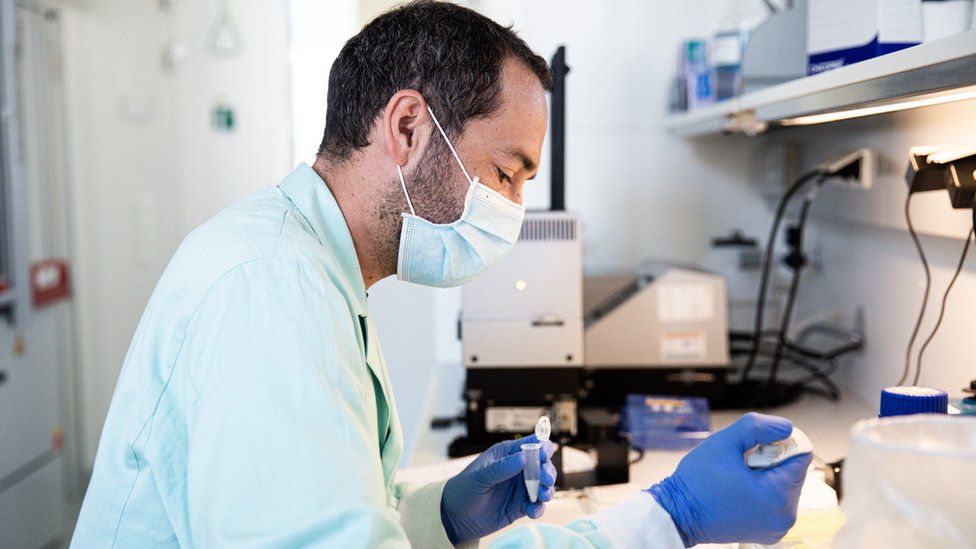Covid in Scotland: Vaccines and treatments 'will still take time'
- Published

In the six months since the UK went into lockdown on 23 March scientists and experts working in Scotland have joined world-wide efforts to develop vaccines and treatments for Covid-19.
With restrictions again being tightened to try to curb the spread of the virus - how is that work going?
How close are we to a vaccine?
Valneva's Livingston plant is undergoing a major upgrade.
Earlier this month the French firm signed a deal with the UK government worth 470 million euros to produce 60 million doses of a coronavirus vaccine called VLA 2001, if vaccine development is successful.
This would be an inactivated whole virus vaccine which means it contains no live virus that could cause viral replication.
While other types might only be suitable for healthy adults, Valneva hopes its vaccine will be suitable for use more widely, including for at risk groups like the elderly.
David Lawrence, chief financial officer for Valneva, said: "Clinical trials will start in December and we will start commercial production in January next year with the aim of delivering 60 million doses by the end of 2021."
According to the World Health Organization (WHO) more than 170 research teams worldwide are racing to produce a vaccine.
Some are moving faster than others and have progressed to the latter stages of testing. So far none has been approved for general use.
Prof Massimo Palmerini, director of the centre for virus research at Glasgow University, said knowledge of other types of coronavirus had made progress faster but it was hard to say when a vaccine would be ready.
"The frontrunners of the vaccines that are being developed at this moment are the ones that are based on platforms that have been developed years ago and bits can be exchanged so can be used for different viruses," he said.
"However then the steps to see if it is effective, even if we accelerate it, will still take time"
What about new treatments?
Significant progress has been in made in how coronavirus is treated, particularly for those who become most unwell and require hospital treatment.
Prof James Chalmers is professor of respiratory research at the University of Dundee and a consultant at Ninewells hospital.
He said the hospital has treated more than 1,000 coronavirus patients over the past six months and saw almost all of them as part a study he is leading into the long term health impacts of Covid-19.
Back in March, there were no specific treatments for coronavirus.
"What has really changed over the last six months is that as more trials have been conducted, we have found specific therapies for coronavirus - the most well-known being dexamethasone, the anti-inflammatory," said Prof Chalmers.
"We have also learnt that many patients can avoid going onto the ventilator by using these tight fitting masks so that is an alternative that buys times for the lungs to heal up."
Dexamethasone, a steroid previously used to treat a variety of conditions, has been hailed as a game changer for Covid-19 outcomes.
Prof Martin Landray is a professor of medicine and epidemiology at the University of Oxford and led the Recovery trial into the effectiveness of dexamethasone and other known drugs.
He told BBC Scotland research is now moving on to tailored treatment for coronavirus.
The BBC's Rebecca Morelle explains how the monoclonal antibodies work
"Now we are getting, for the first time, some treatments that are coming through to clinical trials that were actually designed specifically for this virus," said Prof Landray.
"These are particularly the monoclonal neutralising antibodies, they stick to the outside of the virus, stop it getting into cells, stop it reproducing, stop it doing its damage.
"Those antibodies are showing real promise but we need the trials and we need the results to see if that promise turns into reality."
- Published15 March 2022